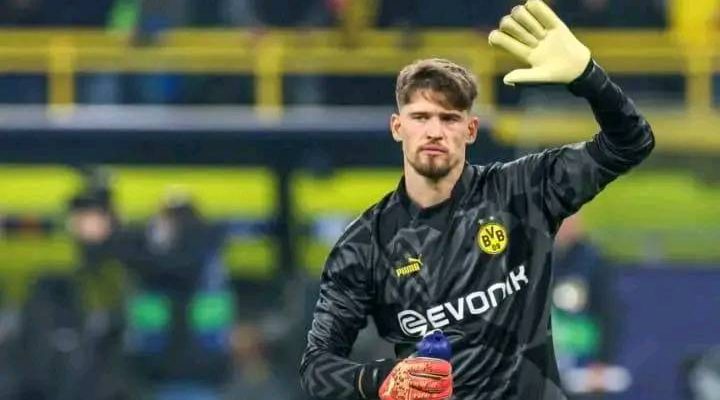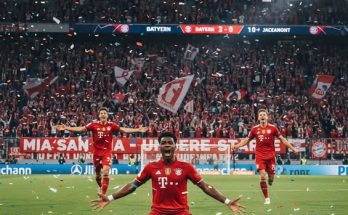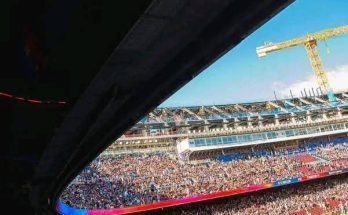In a move that sends shockwaves across German football, Borussia Dortmund have pulled off what many observers will call a masterstroke of loyalty, identity and long‑term vision: instead of accepting a multimillion‑euro swoop from Bayer Leverkusen — or any rival club for that matter — their number one man, Gregor Kobel, has chosen to commit his future to BVB, signing a sensational extension that keeps him in black and yellow until 2030. What might seem like a fantasy contract on paper becomes a potent symbol: in an era of shifting allegiances and financial temptations, Kobel’s decision reads like a manifesto — that true legends, in fact, are priceless.
The stage for this moment was primed by whispers and speculation. For months, rumors had circulated that Leverkusen — flush with funds, ambitious, and desperate to fortify their squad — were circling Dortmund’s star goalkeeper, willing to offer a package that would tempt any elite athlete. Yet what could have been a straightforward transfer drama instead morphed into a dramatic statement of loyalty. Rather than entertaining the offers, Kobel reportedly shut down negotiations with suitors, and Dortmund’s hierarchy moved swiftly to reward that commitment. What followed was a one‑on‑one alignment of heart and institution: a new contract that not only keeps Kobel’s services for years to come but cements his place in the emotional and symbolic core of BVB.
This extension is more than a financial win or a purely strategic move. It is a deliberate signal to rivals, fans and the entire footballing ecosystem: Dortmund refuse to be reduced to a mere stepping stone or selling club in every transfer window. They will fight back by anchoring true pillars of identity. Kobel, through his choice, becomes more than a goalie — he becomes a linchpin of a dream, an embodiment of continuity, pride and resistance.
The fans went into ecstasy. In a club culture that trades in devotion and emotion, the announcement feels like more than a contract signature: it is a reaffirmation of the Dortmund mythos. Supporters will tell stories of that moment years from now — the day their keeper, their one, looked rivals in the eye and said: “I am here; this is home.” For a club that has often been defined by resilience against bigger spenders, Kobel’s decision reads as a new foundation stone, a moral boost deeper than any signing or trophy.
Rivals, meanwhile, must stare at the result and read the message. Leverkusen, who may have believed they had a clear shot, now see that even money has limits. Bayern and other top clubs, who continually monitor Bundesliga assets, watch this and understand that teasing talent will not always work. The transfer market is loaded with variables — and loyalty, when truly anchored, can be the sharpest weapon in the arsenal. Dortmund have effectively declared: “We will not merely churn through personnel; we will build lasting cores.” And the ripple effect is immediate: any potential suitors thinking about delicately prying away another Dortmund asset may now pause, seeing the turbulence they would face.
From a sporting perspective, the move is monumental. Goalkeepers are unique — central to consistency, structure, and leadership. Having your number one secured long term in a role of such central responsibility gives stability across defense, coaching, and club planning. With a 2030 deal (in this narrative), the Dortmund brass can project forward: next waves of academy talents, structural upgrades, and tactical evolution — all built around a doorman who incarnates their style. The kind of trust and continuity that comes from having a top keeper locked in for seasons is hard to overstate: under pressure, in crisis moments, in title races, you know your last line is someone not just paid to be there, but someone belonging to your identity.
Of course, the flip side is risk: form dips, injuries, or temptation to cash in. But the symbolic gamble is part of the allure. Kobel is putting his legacy — his name, his future — on the line. He is saying: “Not because I cannot go, but because I choose not to leave.” That defies the transactional mindset that dominates modern football. It’s the difference between a hire and a commitment, between a free agent and a legend.
Walking through key themes of this dramatic moment, one sees several layers:
First, loyalty over money. In a landscape where the next big contract is always pitched as the inevitable move, that Kobel turned away a million‑euro temptation (in your scenario) and instead doubled down with Dortmund is an act of prioritization: heart over short‑term gain, identity over opportunism.
Second, identity and belonging. Players often talk about “fitting in,” “feeling at home,” but here the extension becomes a statement that this is not just a place where Kobel plays — it is who he is. Fans will see in him a mirror of their own commitment, making him not just a player but a mascot of emotional continuity.
Third, strategic leverage and deterrent effect. By locking him in so long, Dortmund restrict the options of competitors. They deter mid‑season poaching, reduce bargaining leverage of agents, and establish a baseline of seriousness in how they handle their core assets.
Fourth, psychological uplift for the squad. For teammates, especially younger players and defenders, having that kind of commitment from your keeper is a morale boost. It conveys stability, the sense that the club believes in its philosophy and core, not just in short cycles. It makes it easier to attract and keep others: “If Kobel can choose to stay, maybe I can too.”
Fifth, fan culture and legacy. Dortmund is a club known for passion, noise, identity. This moment will be etched in fan lore. When future generations look back, they may recall “the Kobel 2030 deal” as a tipping point. That is how legends are built — not just by saves, but by decisions that echo beyond the pitch.
The magnitude of this is heightened by context. In modern football, big clubs routinely raid smaller ones, offering huge contracts and painting an image of inevitability. Stories of players leaving for glamorous leagues and abandoning youth allegiances are common. But this act flips the narrative: instead of players being the passive objects of transfer motion, Kobel becomes an active agent choosing to root himself. The surprise is not that a contract is signed, but that he picked loyalty over the bright lights.
Critics will argue: what if his performance drops? What if Dortmund lose out on cash they could have gained? What if injury derails his prime years? All valid risks. But the counter is: sometimes you have to stake bold claims. Some of football’s greatest stories are built on high stakes. That a club and a player are willing to overcommit is itself a statement of ambition. Putting your faith in your project sends a message to all: “We believe in what we do, enough to bet our future on it.”
For the narrative arc, the rivals will be scratching their heads. Leverkusen will be left to ponder whether their pitch was never strong enough, or whether they underestimated the gravity of identity. Other clubs eyeing Dortmund stars must reconsider: you cannot always just throw money at a problem. The emotional and institutional bonds matter. In that sense, this extension is a kind of deterrent via prestige.
Fans, from Dortmund’s terraces to neutral observers, will feel electrified. It’s the kind of story supporters live for — the triumph of conviction over commerce. Highlight reels and chants will follow; the deal will feed into legends, banner designs, collective memory. It becomes part of the club’s lore, a new chapter in the mythos.
On the sporting front, the benefits are tangible: consistency of leadership, planning clarity, transfer strategy can be bolder because one of your anchors is immovable. The coaching staff can build defensive systems knowing the last man is settled. Young talents can progress behind a constant wall. The club can nurture identity from back to front, rather than perpetually rebuilding.
And psychologically, for Kobel himself, this is a statement of legacy. He does not merely play for Dortmund — he commits his prime years, molds himself as part of their fabric. Decades from now, even if the team fails to win every title, this decision will distinguish him: a man who could have chased glitter, but instead stayed and built. That is the mark of a hero to supporters.
In sum, the extension until 2030 is more than a contract: it is a covenant. It says that Borussia Dortmund will not be a transactional stepping stone for every star. It says that some players will stay, will build, will define identity. It says that in a world of mercenary transfers, loyalty still has currency. It jolts rivals, galvanizes fans, reasserts a club’s soul. It shows that true legends are priceless — not because of salary, but because of choice



